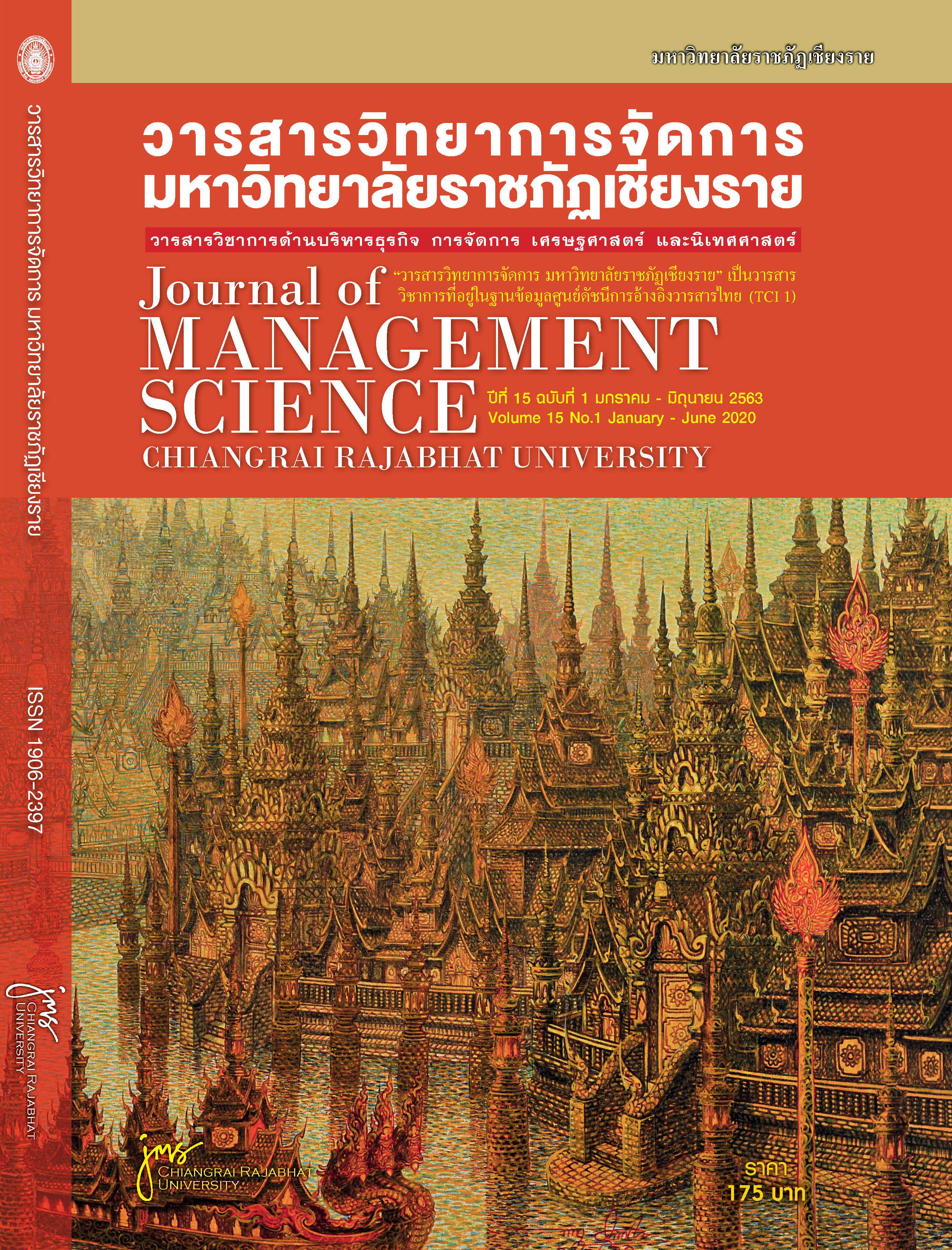การสื่อสารวัฒนธรรมอีสานในภาพยนตร์ “ไทบ้าน เดอะซีรีส์”
Main Article Content
บทคัดย่อ
การวิจัยนี้เป็นการวิจัยเชิงคุณภาพ มีวัตถุประสงค์เพื่อศึกษาถึงการสื่อสารวัฒนธรรมอีสานในภาพยนตร์ ไทบ้าน เดอะซีรีส์ และศึกษาการประกอบสร้างวัฒนธรรมร่วมในภาพยนตร์ไทบ้าน เดอะซีรีส์ โดยการวิเคราะห์ตัวบทภาพยนตร์ ร่วมกับการสัมภาษณ์ผู้กำกับภาพยนตร์ เพื่อนำมาใช้ประกอบการวิเคราะห์ตัวบทภาพยนตร์ ผลการศึกษาพบว่า ภาพยนตร์ไทบ้าน เดอะซีรีส์ มีการสื่อสารวัฒนธรรมอีสาน ทั้งหมด 4 ประเภท คือ ประเภทศิลปะ ประเภทมนุษยศาสตร์ ประเภทกีฬาและนันทนาการ และประเภทคหกรรมศิลป์ ภาพยนตร์เรื่องนี้ มีการสื่อสารอย่างตรงไปตรงมา ลงรายละเอียดให้เห็นภาพความเป็นชนบทอีสานในช่วงเวลาเมื่อ 10 -15 ปีที่ผ่านมา ผสมกับภาพของภาคอีสานในยุคปัจจุบัน ที่มีเทคโนโลยีต่าง ๆ เข้ามามีส่วนในการใช้ชีวิตประจำวัน ควบคู่กับการเล่าเรื่องถึงวิถีชีวิตของชาวบ้านที่ยังดำเนินชีวิตในรูปแบบเดิม ๆ สะท้อนมุมมองคนอีสานที่สามารถอยู่ร่วมกันได้ด้วยความสงบสุข สันติ มีความเอื้ออาทร ด้วยความรักและสามัคคีต่อกัน โดยสอดแทรกการเล่าเรื่องเหล่านี้ไปในวัฒนธรรมอีสานที่ปรากฏอยู่ในภาพยนตร์ ซึ่งสอดคล้องกับความตั้งใจของผู้กำกับที่ต้องการเล่าในมุมอีสานที่มีความสงบ สวยงาม และมีเสน่ห์ ในแบบของตัวเองท่ามกลางยุคที่มีเทคโนโลยีเข้ามาในชีวิตประจำวัน โดยผู้ผลิตภาพยนตร์ได้มีการประกอบสร้างลงไปในตัวบทภาพยนตร์ ซึ่งมีลักษณะเป็นอีสานแบบใหม่ เพื่อให้เข้าถึงกลุ่มวัยรุ่นและคนรุ่นใหม่ได้ เรียนรู้ เข้าใจ และพร้อมยอมรับ วัฒนธรรมอีสานให้คงอยู่เป็นวัฒนธรรมลูกผสม
Article Details
ทัศนะและข้อคิดเห็นของบทความที่ปรากฏในวารสารฉบับนี้เป็นของผู้เขียนแต่ละท่าน ไม่ถือว่าเป็นทัศนะและความรับผิดชอบของกองบรรณาธิการ
เอกสารอ้างอิง
Bunpran, P. (2017). Thibaan The Series by Prab Boonparn. Retrieved April, 18, 2018 from https://www.matichon.co.th/news/494156
Charoensuk, T. (2017). Thibaan The Series 2, Emphasize the success of local entertainment. Matichon. P.32. (in Thai)
Chummuengpak, M. (2005). The narrative of Thai Popular comedy film series "Boonchoo" and the director's creative approaches. Master Thesis of Mass Communication, Faculty of Communication Arts, Chulalongkorn University. (in Thai)
Everett M., Kincaid, D.K. (1981). Communication Networks: Toward a New Paradigm
for Research. New York : Free Place.
Kaewthep, K. (2002). The science of Media and Cultural Studies. Bangkok : Phabpim. (in Thai)
Kaewthep, K. (2010). New Paradigm in Communication Studies. Bangkok : Phabpim. (in Thai)
Marketeer. (2018). Check out Thai movie. Marketeer Magazine. 19 (223). 48-51. (in Thai)
Orapun, P. (2008). Intercultural communication of Malay-Thai in Southern Thailand and Thai-
Malaysian in Kelantan, Malaysia. Dissertation of Mass Communication, Faculty of
Journalism and Mass Communication, Thammasat University. (in Thai)
Pewporchai, P. (2005). Isarn countrysongs and characteristics of the language and their
reflection on local culture : The study of Siriporn Ampaipongsa's songs : Research Report,
Faculty of Art, Ubonratchatanee University. (in Thai)
Phongsorn, S. Director. Interview on 28 March, 2017. (in Thai)
Shuepradithkul, W., Nitikasetsoonthorn, P. & Thongprayoon, C. (2016). Ethnic Identity and Cultural Product. Journal of Management Science Chiangrai Rajabhat University. 11(2). 191-212. (in Thai)
Sirotthammaporn, P. (2009). The Dissemination of Northeastern Culture via NOO-HIN
INTER Comics to secondary students. Master Thesis of Mass Communication, Faculty of
Journalism and Mass Communication, Thammasat University. (in Thai)
Srijinda, P. (2011). Thai Films after the first 100 years its the changed of Thai society In Humanity.
Jounal of Kasetsart University. 18(2). 157-176. (in Thai)
Thairat online. (2017). Amazing!!! 28 million : Thibaan The Series go to TV the next year. (2017). Retrieved April, 18, 2018, from https://www.thairath.co.th/content/1036694
Thasanabanchong, C. (2002). Thai film standard development. Dissertation of Communication Arts, Faculty of Communication Arts, Chulalongkorn University. (in Thai)
Thepkumpanat, A. (2005). Cultural : Meaning, Concept and Issues related : Research Report. Bangkok : Office of the National Culture Commission, Ministry of Culture. (in Thai)


